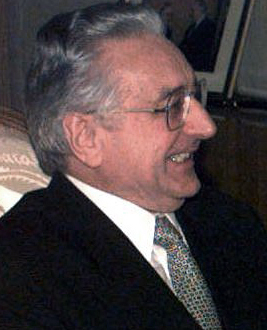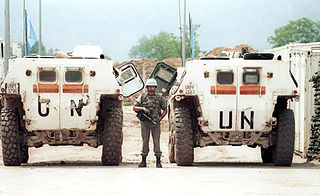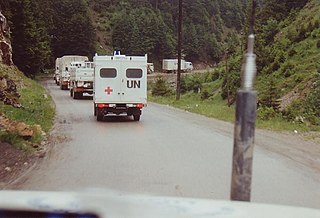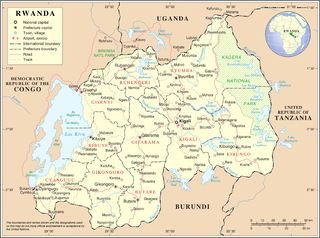
United Nations Security Council resolution 713, adopted unanimously on 25 September 1991, after receiving representations from a number of Member States and commending the efforts of the European Community in the region, the Council decided to impose, under Chapter VII, an arms embargo on the Socialist Federal Republic of Yugoslavia, in light of the outbreak of fighting in the country. Resolution 713 was the first resolution that concerned the breakup of Yugoslavia.

United Nations Security Council resolution 721, adopted unanimously on 27 November 1991, after reaffirming Resolution 713 (1991) on the situation in the SFR Yugoslavia, the council strongly supported the efforts of the Secretary-General Javier Pérez de Cuéllar and his Personal Envoy to help end the outbreak of fighting in parts of the country, in the hope of establishing a peacekeeping mission.

United Nations Security Council resolution 724, adopted unanimously on 15 December 1991, after reaffirming resolutions 713 (1991) and 721 (1991) and noting a report by the Secretary-General Javier Pérez de Cuéllar on the situation in the Socialist Federal Republic of Yugoslavia, the council agreed to carry forward proposals for a planned peacekeeping operation in Yugoslavia and decided to establish a committee of the Security Council to consider matters relating to the arms embargo on the country.

United Nations Security Council resolution 727, adopted unanimously on 8 January 1992, after reaffirming resolutions 713 (1991), 721 (1991), 724 (1991) and considering a report by the Secretary-General Boutros Boutros-Ghali, the council welcomed the recent signing of an agreement in Sarajevo regarding a ceasefire to the conflicts in the Socialist Federal Republic of Yugoslavia.

United Nations Security Council resolution 740, adopted unanimously on 7 February 1992, after reaffirming resolutions 713 (1991), 721 (1991), 724 (1991) and 727 (1992) and considering a report by the Secretary-General Boutros Boutros-Ghali, the Council approved plans for a peacekeeping mission in the Socialist Federal Republic of Yugoslavia.

United Nations Security Council resolution 743, adopted unanimously on 21 February 1992, after reaffirming resolutions 713 (1991), 721 (1991), 724 (1991), 727 (1992) and 740 (1992), and considering that the situation in the Socialist Federal Republic of Yugoslavia constituted a threat to international peace and stability, the council established a peacekeeping mission in the country, known as the United Nations Protection Force (UNPROFOR), with the aim of reaching a peaceful political settlement in the region.
United Nations Security Council resolution 749, adopted unanimously on 7 April 1992, after reaffirming resolutions 713 (1991), 721 (1991), 724 (1991), 727 (1992), 740 (1992) and 743 (1992), the Council approved of a report by the Secretary-General Boutros Boutros-Ghali and decided to authorise the earliest possible deployment of the United Nations Protection Force (UNPROFOR) in the former Yugoslavia.

United Nations Security Council resolution 757 was adopted on 30 May 1992. After reaffirming resolutions 713 (1991), 721 (1991), 724 (1991), 727 (1992), 740 (1992) 743 (1992), 749 (1992) and 752 (1992), the Council condemned the failure of the authorities in the Federal Republic of Yugoslavia to implement Resolution 752.

United Nations Security Council resolution 758, adopted unanimously on 8 June 1992, after reaffirming resolutions 713 (1991), 721 (1991), 724 (1991), 727 (1992), 740 (1992) 743 (1992), 749 (1992), 752 (1992) and 757 (1992), the council, in accordance with a report by the Secretary-General Boutros Boutros-Ghali, decided to enlarge the mandate and strength of the United Nations Protection Force (UNPROFOR) in former Yugoslavia.

United Nations Security Council Resolution 761, adopted unanimously on 29 June 1992, after reaffirming Resolutions 713 (1991), 721 (1991), 724 (1991), 727 (1992), 740 (1992) 743 (1992), 749 (1992), 752 (1992), 757 (1992), 758 (1992) and 760 (1992), the Council authorised the Secretary-General to immediately deploy additional elements of the United Nations Protection Force in Croatia and Bosnia and Herzegovina during the Yugoslav Wars.

United Nations Security Council resolution 762, adopted unanimously on 30 June 1992, after reaffirming resolutions 713 (1991), 721 (1991), 724 (1991), 727 (1992), 740 (1992) 743 (1992), 749 (1992), 752 (1992), 757 (1992), 758 (1992), 760 (1992) and 761 (1992), the Council urged all parties to honour their commitments to the United Nations plan in former Yugoslavia and complete a cessation of hostilities.

United Nations Security Council resolution 764, adopted unanimously on 13 July 1992, after reaffirming previous resolutions on the topic, the Council noted the violations of the agreement concerning Sarajevo International Airport which established a security corridor and demanded withdrawal of anti-aircraft weapon systems, and decided to authorise an additional deployment of United Nations Protection Force personnel. It would increase the size of the Force to two infantry battalions.

United Nations Security Council resolution 769, adopted unanimously on 7 August 1992, after reaffirming Resolution 743 (1992) and all subsequent resolutions relating to the United Nations Protection Force (UNPROFOR), the Council authorised enlargements in the strength and mandate of UNPROFOR to "enable the Force to control the entry of civilians into the United Nations Protected Areas", in addition to performing immigration and customs functions.

United Nations Security Council resolution 770, adopted on 13 August 1992, after reaffirming previous resolutions on the topic, including Resolution 743 (1992), Resolution 749 (1992), Resolution 761 (1992) and Resolution 764 (1992), the Council recognised the humanitarian situation in Sarajevo and other areas in Bosnia and Herzegovina.

United Nations Security Council resolution 771, adopted unanimously on 13 August 1992, after reaffirming resolutions 713 (1991), 721 (1991), 724 (1991), 727 (1992), 740 (1992), 743 (1992), 749 (1992), 752 (1992), 757 (1992), 758 (1992), 760 (1992), 761 (1992), 762 (1992), 764 (1992), 769 (1992) and 770 (1992), the council expressed concern at and condemned widespread violations of international humanitarian law in the territory of the former Yugoslavia and in particular, Bosnia and Herzegovina.

United Nations Security Council resolution 776, adopted on 14 September 1992, after reaffirming Resolution 743 (1992) and noting offers of assistance made by Member States since the adoption of Resolution 770 (1992), the Council authorised an increase in the size and strength of the United Nations Protection Force in Bosnia and Herzegovina and other areas of the former Yugoslavia.

United Nations Security Council resolution 1200, adopted unanimously on 30 September 1998, after recalling resolutions 955 (1994), 989 (1995) and 1165 (1998), the Council forwarded 18 nominations for judges at the International Criminal Tribunal for Rwanda (ICTR) to the General Assembly for consideration.

United Nations Security Council resolution 1449, adopted unanimously on 13 December 2002, after recalling resolutions 955 (1994), 1165 (1998), 1329 (2000), 1411 (2002) and 1431 (2002), the Council forwarded a list of nominees for permanent judges at the International Criminal Tribunal for Rwanda (ICTR) to the General Assembly for consideration.

United Nations Security Council resolution 1482, adopted unanimously on 19 May 2003, after noting correspondence between the President of the Security Council, President of the International Criminal Tribunal for Rwanda (ICTR) and President of the International Criminal Court, the Council extended the terms of office of four permanent judges at the ICTR in order to allow them to dispose of a number of ongoing cases.

The United Nations Supervision Mission in Syria (UNSMIS) was a United Nations peacekeeping mission in Syria, set up in 2012 as a result of United Nations Security Council Resolution 2043 in response to the Syrian Civil War. It was commanded by Norwegian Major General Robert Mood until 20 July 2012 followed by Lieutenant General Babacar Gaye from Senegal. Although observers remain in the country, Mood suspended their mission on June 16, 2012, citing "escalating violence". Observers will conduct no further patrols and stay in their current positions until the suspension is lifted. On 20 July 2012, the Security Council extended UNSMIS for a final period of 30 days. According to resolution 2059, the Council would only consider more extensions in the event that the Secretary-General reports and the Security Council confirms the cessation of the use of heavy weapons and a reduction in the level of violence sufficient by all sides to allow UNSMIS to implement its mandate.
















